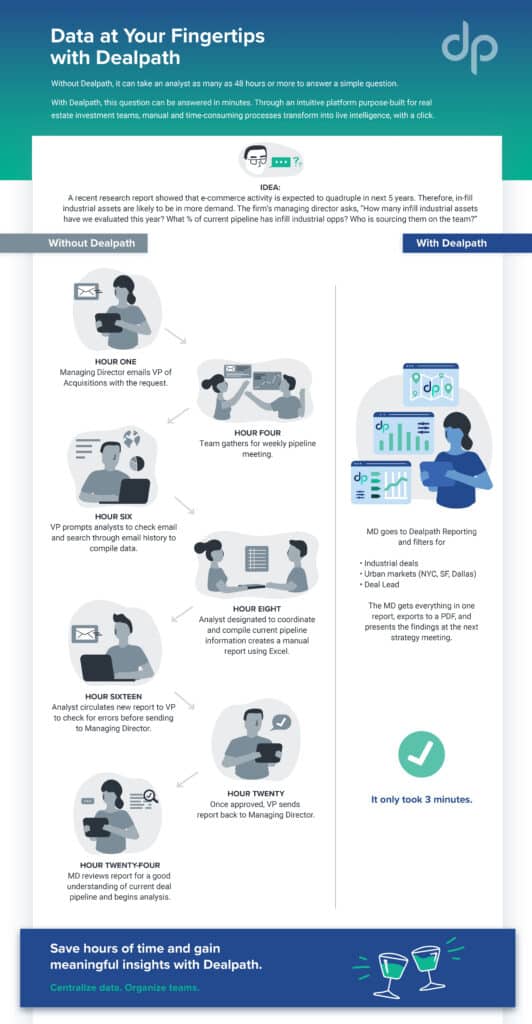This blog post was last updated on Wednesday, November 29th.
In today’s digital-first world of proptech, emails, spreadsheets and physical documents simply can’t offer the accuracy or agility required by modern deal teams. Speed, precision and scale can make the difference between capturing emerging opportunities and following the market’s lead. Real estate deal management software is key to creating–and defending–your competitive advantage by surfacing profitable opportunities and managing risk with rigor.
Firms that take an opportunity now to digitize processes and build proprietary deal databases are positioned to win as opportunities emerge. In this blog post, we’ll explore why real estate deal management software has become the gold standard for firmwide alignment and data-driven conviction.
What Is Deal Management Software in Commercial Real Estate?
Real estate deal management software acts as a command center for institutional deal teams to streamline collaboration and inform decision making from sourcing through pipeline tracking, due diligence, and closing.
As your firm screens new deals, you can build a proprietary deal database of market intelligence to support future decisions, as well as report on investment activity with modern sophistication.
Without a dedicated real estate investment software solution, many firms have historically cobbled together Excel checklists, file storage platforms, and generic project management tools to manage acquisitions, development and financing deals. However, highly paid team members can make a stronger impact by minimizing time spent on admin tasks in favor of more strategic work.
Aligned around one source of truth, firms can manage their workflows in one centralized place, maximizing efficiency and optimizing risk management.

By adopting Dealpath, the first and leading real estate deal management software, our clients have achieved meaningful efficiencies, such as streamlining ad-hoc report creation, capturing a higher volume of deal data and market intelligence, and streamlining collaboration across their pipelines.
1. Improve Operational Efficiency & Collaboration With Real Estate Deal Management Software
Centralizing deal data and information in one command center eliminates much of the manual data entry and analysis that previously took a toll on professionals at all levels. Deal management software delivers the efficiency your firm needs to remain competitive with automation and repeatability.
Eliminate Manual Data Entry
From source through close, deal management software builds efficiency by eliminating manual data entry, creating additional bandwidth for higher-impact work.
AI-powered deal ingestion adds deals directly to the top of the funnel, helping your firm choose whether to pass immediately or evaluate the deal under a closer lens. Centralized data also streamlines data entry when creating documents like LOIs and IC memos.
Centralized Document Management & Communication
Siloed information that can only be accessed by owners or requested via email prolongs investment processes. Real estate deal management software centralizes all deal data, information and documents in one command center to break down these silos. As deals progress, deal teams can add comments, creating valuable context about decision logic months or years later.
Consequently, anyone in the organization–including downstream teams like portfolio and asset management–can access the latest information with ease.
Configurable, Collaborative & Automated Workflows
Why recreate a checklist for each new deal when you can kickstart underwriting? Automating role-based workflows in Dealpath ensures that teams waste no time with manual delegation, pushing deals to the right stakeholders while simplifying approvals. Robust deal management solutions offer direct access to third parties, like environmental and legal consultants, to attach relevant documents or share updates.
Recreating your unique workflows in Dealpath adds institutional rigor to your process, optimizing risk management.
2. Enhance Real-Time Pipeline Visibility
To make efficient, data-driven investment decisions, your firm must be able to systematically identify and prioritize profitable deals that match your target risk profile. Real estate deal management software creates the visibility required by stakeholders at all levels to uncover these opportunities and make informed decisions with intuitive data analytics and automated reporting.
View All Deal Details in One Centralized Hub
Whether you’re showing the deal to the Managing Director for the first time or pitching the IC, you can’t risk showing outdated information. Deal management software centralizes all relevant information in one hub, from financial metrics to relevant comparables and beyond. Any stakeholders, from IC members to portfolio managers seeking details after closing, can find the information they need with confidence in its accuracy–even by searching deal details that might be inside an OM.
Manage Tasks and Critical Dates for Every Real Estate Deal in Your Pipeline
For enterprise deal teams, staying abreast of every critical date is vital for risk management. Managing tasks in real estate deal management software creates visibility into ownership, preventing costly mistakes and setbacks. Critical date reports can illustrate upcoming deadlines on the horizon, while staffing workload reports detail which team members might have additional bandwidth or consistently miss target deadlines.
Track the Latest Updates in a Firmwide Source of Truth
Whether a deal is in the initial stages of underwriting, the late stages of due diligence or nearing closing, deal teams must be able to find the latest updates. Relying on a firmwide source of truth ensures that, as deals progress, all team members have real-time visibility into completed and remaining tasks. Approval audit trails can also help managers and executives to better manage risk.
Automated, Visualized Real Estate Deal Management Reporting
Automated, configurable reporting ensures that all stakeholders in your organization are apprised of pipeline activity, all without distracting analysts from high-impact work. Bespoke reporting allows deal teams to see where their pipelines stand from a 15,000 foot view or through a more granular lens, such as a particular market, sector or broker source.
Relevant, timely reports inform decisions about which deals to prioritize based on the latest updates.
Measure Exposure in Seconds
The next time a lender hits the headlines, you won’t want to wait to understand the impact on your portfolio. Reporting on deals with a particular lender, sponsor or in a specific market can help your firm measure exposure and react before the dust settles.
3. Unlock Your Competitive Data Advantage
Seamlessly capturing unprecedented volumes of data and information and activating intelligence with real-time data analytics positions your firm with a competitive edge, whether you’re waiting for the right moment or actively deploying capital.
Capture Volumes of Market Intelligence
Seamless, AI-powered data ingestion empowers your firm to scale deal screenings with ease. Even if you pass immediately, every deal you capture carries perpetual value in the form of a comparable, informing future decisions. Consequently, you can see every deal in your target markets to unlock greater precision–all without increasing headcount or workload for existing team members.
Slice and Dice Data to Analyze Deals With Speed and Precision
When a new opportunity arises, analysts shouldn’t have to scramble through internal folders and communication channels to pinpoint historical comps. Real estate deal management software puts data at your fingertips in the form of data analytics. Rather than sifting through spreadsheets to compare cap rates, analysts can surface comparables and validate underwriting assumptions by slicing and dicing data.
Systematize Data-Driven Decision Making
Gone are the days where questions posed by the investment committee delay time-sensitive decisions while data is compiled manually. Deal management software ensures that your firm can answer vital stakeholder questions in the moment by surfacing comparables and generating reports immediately. Consequently, you can support every decision with proprietary market intelligence.
17 CRE Investment Questions Your Data Can (Finally) Answer
To outperform the competition and move at digital speed, real estate investment managers must make decisions that are grounded in–not simply supported by–data. Download this guide to learn just a few examples of how CRE investment managers can turn data into answers with unprecedented speed, precision and scale with deal management software.
Download Now




